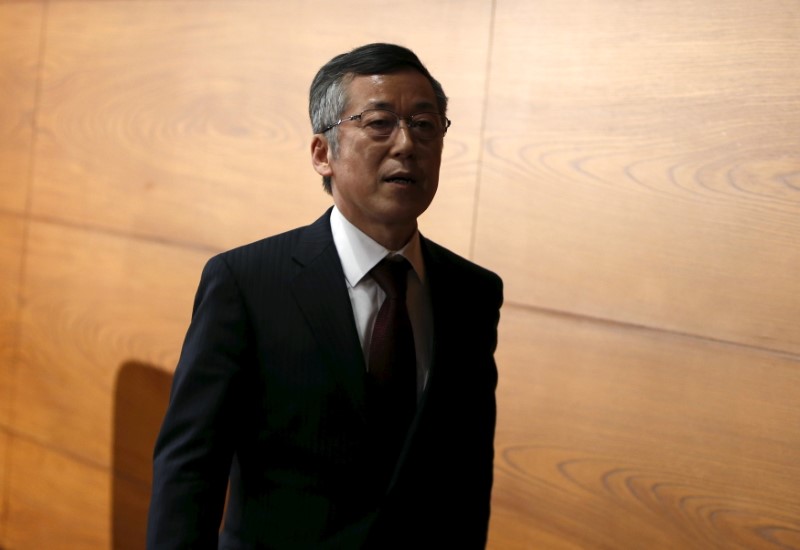By Leika Kihara
KOFU, Japan (Reuters) - Bank of Japan board member Yutaka Harada said on Wednesday the central bank would need to step up stimulus "without delay" if risks to the economy threatened its efforts to hit its inflation target.
But Harada, a vocal advocate of aggressive stimulus, warned it would be hard to affect public perceptions of future price moves with monetary policy alone.
His comments contrast with those made by reflationist-minded policymakers in 2013, when the BOJ deployed its huge asset-buying program, designed to shock the public out of a deflationary mindset. They also underscore the challenges the BOJ faces in firing up inflation to its elusive 2 percent target.
Harada said the BOJ in its policy deliberations needed to focus on how the economy and prices were performing, rather than simply how they affect inflation expectations.
"There is no clear data by which we can measure inflation expectations. Rather, we should look at whether the economy is worsening or whether inflation is slowing permanently," he told a news conference after meeting with business leaders in Kofu, eastern Japan.
He noted the growing risks Japan faced, such as slowing demand in China, simmering trade tensions, volatile stock price moves and weak private consumption.
A scheduled sales tax hike in October could also hurt the economy and push down prices by weakening demand, he said.
"If the economy deteriorates to the extent that achieving the inflation target in the long term becomes difficult, it's necessary to strengthen monetary easing without delay," Harada said in a speech to the business leaders in Kofu.
Harada, however, said he did not expect Japan's economy to slip into recession, signaling that he did not see an imminent need to ramp up stimulus.
"We will look at various indicators comprehensively in making the decision," Harada said. If the BOJ were to ease further, it could accelerate money printing, buy more risky assets or cut interest rates, he added.
STRONGER GUIDANCE NEEDED
The BOJ faces a dilemma. Years of heavy money printing have dried up market liquidity and hurt commercial banks' profits, stoking concern over the rising risks of prolonged easing.
And yet, subdued inflation has left the BOJ well behind other major central banks in dialing back crisis-mode policies, leaving it with little ammunition to battle the next recession.
Faced with the need to address the rising cost of easing, the BOJ decided last July to allow long-term bond yields to move more flexibly around its zero percent target.
To reassure markets that monetary policy will remain loose, it also adopted a new forward guidance pledging to keep rates at very low levels for an "extended period of time."
Harada said he dissented to the July decision on the view the BOJ should commit to keeping rates low "unless prices show stronger movements than currently anticipated," rather than to the vague timeframe.
"It's my view that the conduct of monetary policy should be data-dependent, not calendar-based," he said, adding that doing so would make the BOJ's forward guidance more powerful.
The BOJ's nine-member board is split between those like Harada, who sees room to ramp up stimulus, and those who fret about the dangers of protracted easy policy.
Harada dismissed calls from financial institutions that the BOJ should raise rates to ease the strain on their profits, saying that withdrawing stimulus now would backfire by hurting the economy and dampening corporate fund demand.
"Past episodes of premature monetary tightening worsened the economy, drove down prices and output, and led to declines in interest rates in the longer-term," Harada said.
"Premature tightening was thus part of the reason behind the current difficulties the financial industry face," he said.
If financial institutions are struggling to boost lending, they should consider measures to curb deposits so that they are not left with idle money, Harada said.
Under a policy dubbed yield curve control, the BOJ aims to guide short-term rates at minus 0.1 percent and the 10-year government bond yield around zero percent.
